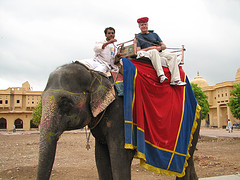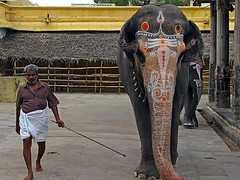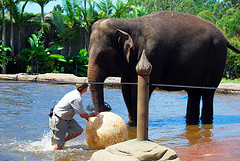Elephas maximus
Who does this elephant mingle with anyway?
Due to their massive size, adult elephants are usually not susceptible to predation by other species in their habitat. They are at the top of the food web and are strictly herbivores. Sometimes, tigers and lions prey on calves and the adult elephants protect their young by forming a defense circle with the calf in the middle.
Human-Elephant Interactions
Humans are the main cause of elephant predation. Elephants have been hunted by humans throughout history. Originally they were hunted for food and later for domestic labor and ivory. Poaching for ivory has been a major reason for the decline of elephant populations throughout Asia.
Palani Mohan, an Indian born photographer of the book, The Vanishing Giants: Elephants of Asia, says, " I'm very interested in the love-hate relationship between the people of Asia and the elephant. The animal is at times revered and worshipped and at other times enslaved and abused."
Mutualistic Interactions and the Elephants Role in the Ecosystem
 In the case of a water drought,
elephants can use their tusks to dig
for water beneath the ground surface
In the case of a water drought,
elephants can use their tusks to dig
for water beneath the ground surface
They can knock down large trees and other vegetation so that smaller animals can get through and forage for food.
Their dung has undigested seeds, nuts, and fruit that are picked up by other animals like birds and consumed. In addition, dung beetles can reproduce in these dung piles.
Since most of their dung has undigested material, it can serve as nutrient-rich manure and replenish poor soil.
Also, many seeds have to pass through an elephant's digestive system before they can be germinated.

